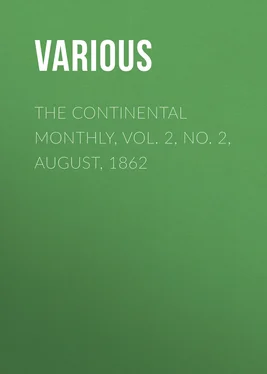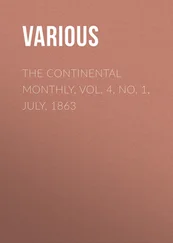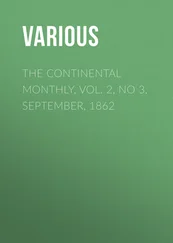Various - The Continental Monthly, Vol. 2, No. 2, August, 1862
Здесь есть возможность читать онлайн «Various - The Continental Monthly, Vol. 2, No. 2, August, 1862» — ознакомительный отрывок электронной книги совершенно бесплатно, а после прочтения отрывка купить полную версию. В некоторых случаях можно слушать аудио, скачать через торрент в формате fb2 и присутствует краткое содержание. Жанр: foreign_antique, periodic, Языкознание, Политика, foreign_edu, на английском языке. Описание произведения, (предисловие) а так же отзывы посетителей доступны на портале библиотеки ЛибКат.
- Название:The Continental Monthly, Vol. 2, No. 2, August, 1862
- Автор:
- Жанр:
- Год:неизвестен
- ISBN:нет данных
- Рейтинг книги:4 / 5. Голосов: 1
-
Избранное:Добавить в избранное
- Отзывы:
-
Ваша оценка:
- 80
- 1
- 2
- 3
- 4
- 5
The Continental Monthly, Vol. 2, No. 2, August, 1862: краткое содержание, описание и аннотация
Предлагаем к чтению аннотацию, описание, краткое содержание или предисловие (зависит от того, что написал сам автор книги «The Continental Monthly, Vol. 2, No. 2, August, 1862»). Если вы не нашли необходимую информацию о книге — напишите в комментариях, мы постараемся отыскать её.
The Continental Monthly, Vol. 2, No. 2, August, 1862 — читать онлайн ознакомительный отрывок
Ниже представлен текст книги, разбитый по страницам. Система сохранения места последней прочитанной страницы, позволяет с удобством читать онлайн бесплатно книгу «The Continental Monthly, Vol. 2, No. 2, August, 1862», без необходимости каждый раз заново искать на чём Вы остановились. Поставьте закладку, и сможете в любой момент перейти на страницу, на которой закончили чтение.
Интервал:
Закладка:
We have occupied more space than we had intended, in considering the Senators from the slave States, and will now attempt to speak of some of the more prominent Northern statesmen, in this paper, and perhaps continue their consideration more at length in a future number.
The present Secretary of State was long regarded as the leading Free-Soil Senator, and after the present Republican party came into existence, he naturally assumed a prominent position among its advocates. In caution, in profound foresight, in coolness and affability of temper, and in perspicuity and logical shrewdness of oratory, he has been without a superior since the death of Webster. He somewhat resembles Earl Russell in the prudence and care with which he treats political questions, and the vigilance with which he notices every symptom of popular tendencies and popular desires. His circumspection is constant, and the imperturbability of his character enables him to be ever on his guard, and protects him from the enunciation of an unpopular idea. Never permitting himself to be annoyed at ever so bitter a taunt, perfectly self-possessed, and always mindful of the courtesy due to his colleagues, and the respect due to the most dignified body in the nation, he has generally succeeded in completely disarming his less prudent antagonists. In general debate, his coolness and mental balance enabled him to cope with the most formidable opponents, and although at times the overwhelming eloquence of Douglas got the better of the more philosophic orator, such an occurrence was rare, and a triumph was gained over him only by the greatest exertions of the greatest orators. His labored speeches, as will be testified to by all who have perused them, are rich in profound thought, a clear discernment and comprehension of events, causes, and results, and occasionally in passages of stately and brilliant eloquence. Graceful rhetoric and shrewd logic appear to be ever at his command, as he has occasion, in the course of argument, to resort to one or the other, to illustrate or to enforce his reasoning. In person, Mr. Seward is of about medium hight, rather stooping, with reddish-gray hair, an aquiline nose, and dull, sleepy, blue eyes. His countenance is hardly intellectual, and no one would suppose, on seeing him for the first time, that he was a man of conspicuous ability. He is affable to every one, and enters freely into conversation with all who call upon him; nevertheless, he is extremely guarded at all times in expressing his opinions, and will never betray himself into an unguarded sentiment. His manner of speaking is extremely easy, and occasionally dull; and when in the Senate, he used to take his position by leaning against the pillar behind his seat, twirling in one hand his spectacles, while with the other he enforced, by slight gestures, the more striking passages of his speech. His delivery was far from animated, and his intonation was rather conversational than declamatory. He has a quiet dignity at all times, which is yet consistent with a polite and amiable demeanor; and while the former inspires the respect, the latter elicits the esteem of all who approach him.
The present Vice-President was, during the last Congress, Senator from Maine. He was long known as an able Democratic politician, and in 1856 was elected Governor of Maine by the Republicans, in a hotly-contested election. He is remarkable rather for a sound judgment and practical good sense than as an orator or in the higher arts of statesmanship. He was always listened to with attention, because all looked upon him as well informed in the everyday duties of the Senate, and as one whose opinion was formed from accurate observation and a clear head. He is in no sense an orator, his delivery not being pleasant or his sentiments couched in graceful or forcible language. He is of a dark complexion, rather tall, with jet-black hair, a little bald, and would not be selected as one of the leading men in the Senate from his personal appearance. As a presiding officer, he ranks well, being apparently posted on parliamentary law and impartial in his decisions, although he has not the dignity and grace which lent éclat to Mr. Breckinridge's performance of the office.
Senator Fessenden, of Maine, is considered one of the first statesmen now prominent before the country; and the ability he has exhibited, not only in the practical details of his position but in the wider range of comprehensive statesmanship, entitles him to a place superior to most and equal to any of his contemporaries. Since the retirement of Senator Hunter from the Finance Committee, (which may be considered as the most important in the Senate,) Mr. Fessenden has executed the duties of its chairmanship with an accuracy and vigilance which has elicited the praise of all sides of the house. His superiority as a financier is marked; but not more marked than his high capacity for comprehending and elucidating the great national issues, which swallow up all minor ones in the magnitude of their importance and the intensity of their interest. For maturity of judgment, deliberateness of thought and manner, fearlessness of speech, a presence of mind never lost, and bitterness of invective, no one ranks above him in the Chamber. His oratory is of that substantial and yet spirited character which at once convinces and interests and engages the attention of the mind, without wearying it by unrelieved exertion. Always the master of every topic on which he attempts to enlighten, he is neither foiled by the sophistries nor embarrassed by the bravadoes of his opponents. His eloquence is not demonstrative, but calm, dignified, and earnest, apparently confident in the correctness of his views, and yet cautious to avoid giving offense to others. He is always listened to with the utmost respect, and his opinions are of much weight among his political friends. His appearance is dignified and highly intellectual; his forehead being broad and indicative of great ability, and his general manner being in harmony with the prominence and responsibility of his office. Never resorting, in default of argument, to the petty malice of personal abuse, his course has been liberal, consistent, and uniformly courteous. In private life, he retains the dignity which appears to be natural to him; but is yet affable and sociable, attracting one alike by the rich products of thought and the courtesy of his manner.
Конец ознакомительного фрагмента.
Текст предоставлен ООО «ЛитРес».
Прочитайте эту книгу целиком, на ЛитРес.
Безопасно оплатить книгу можно банковской картой Visa, MasterCard, Maestro, со счета мобильного телефона, с платежного терминала, в салоне МТС или Связной, через PayPal, WebMoney, Яндекс.Деньги, QIWI Кошелек, бонусными картами или другим удобным Вам способом.
1
The whisky was kept in a back room, above ground, because the dwelling had no cellar. The fluid was kept safely under lock and key, and the farmer accounted for that by saying that his negroes would steal nothing but whisky. Few country houses at the South have a cellar—that apartment deemed so essential by Northern housekeepers. The intervening space between the ground and the floor is there left open, to allow of a free circulation of air.
2
No regular dinner-hour is allowed the blacks on most turpentine-plantations. Their food is usually either taken with them to the woods or carried there by house-servants, at stated times.
Интервал:
Закладка:
Похожие книги на «The Continental Monthly, Vol. 2, No. 2, August, 1862»
Представляем Вашему вниманию похожие книги на «The Continental Monthly, Vol. 2, No. 2, August, 1862» списком для выбора. Мы отобрали схожую по названию и смыслу литературу в надежде предоставить читателям больше вариантов отыскать новые, интересные, ещё непрочитанные произведения.
Обсуждение, отзывы о книге «The Continental Monthly, Vol. 2, No. 2, August, 1862» и просто собственные мнения читателей. Оставьте ваши комментарии, напишите, что Вы думаете о произведении, его смысле или главных героях. Укажите что конкретно понравилось, а что нет, и почему Вы так считаете.












